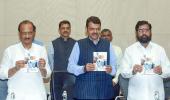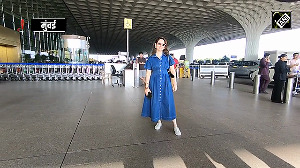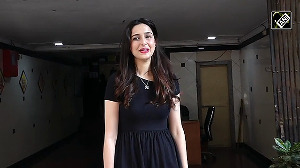In the coming assembly election, negotiations over seat-sharing will be as important as actual outreach to voters.

The background is the upheaval that followed the 2019 assembly elections: The Shiv Sena, under Uddhav Thackeray's leadership, fought in alliance with the Bharatiya Janata Party, but walked out of it weeks later to join the Sharad Pawar-led Nationalist Congress Party and the Congress grouping that calls itself the Maharashtra Vikas Aghadi (MVA).
More fractures followed as both the Shiv Sena and the NCP split with factions led by Eknath Shinde and Ajit Pawar joining the BJP-led Mahayuti.
Many old friends now became bitter foes and the erstwhile allies turned rivals.
There was some reflection of this political confusion in the outcome of the Lok Sabha elections.
Smita Wagh, BJP MP from Jalgaon, said cautiously: "Yes, people found it strange that till yesterday we were attacking leaders like Ajit Pawar but now we are defending them."
It is not just that the old poles of power have shifted in political parties as a result of new alignments. It is also that new ones have emerged.
For instance, Anees Ahmad, former MLA and Congress leader from Nagpur, confessed the new bonhomie between Congress leader Rahul Gandhi and Samajwadi Party (SP) chief Akhilesh Yadav could lead to the Congress signing over several seats in Maharashtra to the SP, "seats that the Congress could have won".
And this much is clear: That in the coming assembly election, negotiations over seat-sharing will be as important as actual outreach to voters.
Conscious of this, all parties have started preparing. Prime Minister Narendra Modi met his party parliamentarians from Maharashtra a day after the Budget. He reportedly told them to fight the Opposition narrative in a united manner.
"The prime minister asked us to outstrip the Opposition propaganda against the government and reach out to every voter at the booth level," a BJP MP who attended the meeting said.
The BJP's alliance partner Shiv Sena (Shinde group) is holding parallel meetings.
Ajit Pawar, state deputy chief minister who broke the NCP and joined the BJP alliance, had a meeting with Home Minister Amit Shah and is expected to meet him again, after he flagged the issue of delays in seat sharing and emphasised the need to reach a consensus on seat adjustment quickly.
The Congress is also leaving nothing to chance.
The party designated a coordination committee, comprising state party President Nana Patole, Vice-President Nana Gawande, and Legislature Party Leader (in the outgoing assembly) Balasaheb Thorat, that will represent the Congress's interests in negotiating for seats with alliance partners.
This was the outcome of several meetings earlier in July between Maharashtra Congress core committee members, MLAs, and MPs in the presence of Congress General Secretary K C Venugopal and Maharashtra election-in-charge Ramesh Chennithala in Mumbai.
More focused senior-level confabulations in Delhi followed last week, where strategist Sunil Kanugolu made a presentation on ground realities.
These negotiations are absolutely crucial to prevent own goals for all parties.
The central question is: What should be the basic organising principle in ticket distribution? Obviously, the larger the number of seats a party fights, the bigger the chances of winning more and with sufficient numbers, of snagging the chief minister's position.
One principle for ticket distribution could be the Lok Sabha election, with the disaggregated assembly segment performance of each party as the criterion for the proportion of seats to be contested in the assembly election.
But this is not judged an accurate barometer as political affiliations have changed since.
Although talks are still on, the Congress expects the 2019 assembly election will be used as the benchmark within the MVA.
According to this result, the (undivided) Shiv Sena won 56 seats of the 124 it contested as part of the 164-124 seat-sharing formula it had hammered out with the BJP.
Of them, Uddhav Thackeray will claim the seats held by MLAs still loyal to him but the seats where his supporters have decamped to the opposite side remain up for grabs.
"In 2019, the Shiv Sena (undivided) won 56 seats, the NCP (undivided) 54, and the Congress 45. That's 155. In addition, there are the seats the BJP won, in collaboration with Shiv Sena (105)," said former Congress chief minister Prithviraj Chavan.
"In 52 such seats, the Congress came second. There are 38 seats where the NCP came second. Both parties will claim these to field their candidates. The rest is up for negotiation," Chavan explained.
The negotiation, Chavan added, would have to take into account smaller parties too.
In 2019, the Communist Party of India-Marxist contested eight seats, the SP seven, and the Swabhimani Paksha five, to cite only a few.
The Congress is aiming to contest 100 seats with the NCP (Sharad Pawar) claiming around 80.

On the other side, the Mahayuti is not having an easy time of it, either.
'If each constituent insists on contesting 100 assembly seats, the parties will have to contest separately. With 288 assembly seats, being offered only 55 seats would be unacceptable for the party,' Amol Mitkari, a member of the Maharashtra legislative council and NCP spokesperson from Akola and a supporter of Ajit Pawar, said a few weeks ago.
The BJP has sought action against him on the grounds that as negotiations are still on, he has spoken out of turn.
So far, there has been no action by Ajit Pawar.
Mitkari has also said on X it was Ajit Pawar who 'saved the day for Eknath Shinde' and without his help, Shinde would not have been able to form the government.
Other partners too are sniping at the BJP.
'Due to the interference of the BJP, we lost the Nasik, Hingoli, and Wasim Lok Sabha seats. Otherwise, Hemant Godse, Hemant Patil, and Bhawana Gawali would have been re-elected Lok Sabha MP. We hope the BJP does not make the same mistake in the assembly elections,' Ramdas Kadam of the Eknath Shinde-led Shiv Sena said at a press conference.
BJP Spokesperson Syed Zafar Islam told Business Standard the party had faith in Devendra Fadnavis's ability to bring together diverse opinions.
"We will give the assembly elections everything we've got. We will fight to win. And we will win."
Not everyone agrees.
"In the Lok Sabha the people voted decisively against the BJP. The NDA (National Democratic Alliance) will be out in 2024," said Chavan, adding, "the party keeps saying Fadnavis is their best bet. Let us see if the senior leadership backs Fadnavis".
Feature Presentation: Aslam Hunani/Rediff.com












 © 2025
© 2025